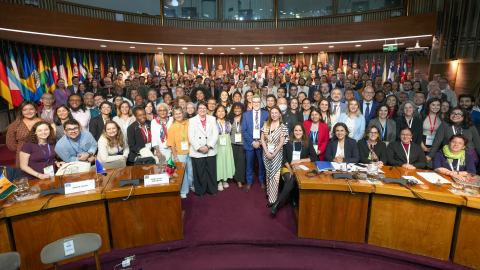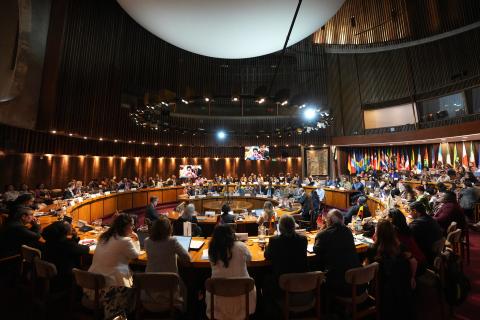Briefing note
Globalization offers opportunities for development but also poses risks. Latin America and the Caribbean must adopt a pro-active agenda to deal with a phenomenon that has profound historical roots and now demands a different approach from the past due to drastic political changes, combined with the revolution in communications and information technology, which have added a dizzying new spin to its most recent phase. This led the countries of the region to request that the Economic Commission for Latin America and the Caribbean (ECLAC) focus its 29th Session on the twin issues of globalization and development.
This meeting, held every two years, is ECLAC's most important gathering. It will take place this year in Brasilia, 6 - 10 May. During the session, governments will examine the Commission's activities during the previous two years and will approve its work plan for the next two years. Nearly 200 delegates from the 48 member countries and the United Nations' specialized bodies, non-governmental organizations and special guests will attend.
At the meeting, ECLAC will present its report, Globalization and Development, which diagnoses the region's current situation, analyses development challenges, and provides concrete public policy proposals. The meeting begins with a technical phase, from 6 to 8 May, during which the report will be presented. Brazilian president, Fernando Henrique Cardoso, and ECLAC Executive Secretary, José Antonio Ocampo, will officially open the ministerial session, which begins on Thursday 9 May and lasts until 10 May.
Globalization is defined as 'the growing influence exerted at the local, national and regional levels by financial, economic, environmental, political, social and cultural processes that are global in scope'. The document suggests that national strategies should be designed as a function of the possibilities that this process offers and deal with the demands inherent in greater involvement in the world's economy. At the same time, ECLAC warns governments that they will likely face additional financial and trade instability, the risk of possible exclusion of countries that are poorly prepared for the strong demands for competitiveness in today's world, and the risk of further deepening existing differences between companies, social sectors and regions in countries that participate in the world's economy in a segmented and marginal fashion.
Globalization is a multi-faceted process. While its economic aspects are better known, ECLAC recognizes the importance of other dimensions that fall outside the strictly economic sphere. It highlights, for example, the 'globalization of values', which is the gradual expansion of shared ethical principles. Its most important expression includes human rights declarations, which deal with both civil and political rights, along with economic, social and cultural rights, as expressed in the declarations produced by the United Nations' World Summits. Another sign of progress are the new judicial principles established internationally, such as Principle 7 of the Rio Declaration, regarding 'common but differentiated responsibilities', which essentially recognizes the environmental debt that some countries have accrued with the rest of the world as a result of their industrialization.
In the past 130 years, the process of globalization has gone through three stages. The first (1870-1913) was marked by the enormous mobility of capital and labour, along with rising trade based on a sharp reduction in transport costs rather than free trade principles. After World War II, a new stage of global integration began (1945-1973), in which international institutions for technical, financial and commercial cooperation developed, while trade in manufactured goods expanded between developed countries. During this period a great range of economic organizational models along with limited mobility of capital and labour co-existed.
Eventually, the final quarter of the twentieth century ushered in a third phase of globalization, with the gradual spread of free trade, the growing presence on the international scene of transnational corporations operating as integrated production systems, the expansion and notable mobility of capital and a shift towards the standardization of development models. At the same time, restrictions on the movement of labour persisted, access to information in 'real time' became more massive, thanks to the development of communications and information technology, and there was a clear trend toward more homogeneous models for economic development, ECLAC points out.
In the first section, Globalization and Development provides an overview, analyzing the historical and multi-faceted nature of this phenomenon. It then reviews specific economic trends, particularly in trade and financing, macroeconomic approaches and finances, and the international mobility of labour. Trends in unequal income distribution and imbalances in the global order are then examined. Finally, the document presents a proposal for a pro-active agenda for Latin America and the Caribbean in the global era.
The second section provides a regional perspective and deals with more specific issues: external vulnerability and macroeconomic policy; Latin America and the Caribbean's participation in global productive and trade circuits; strengthening of systems for technological development and innovation; international migration; environmental sustainability; social development; the effects of globalization on the economies of the Caribbean. Each chapter provides a series of recommended measures at the national, regional and international levels, which are detailed in the proposed agenda. A complete series of supportive statistical date provides invaluable information about a wide range of areas involved in regional development.


